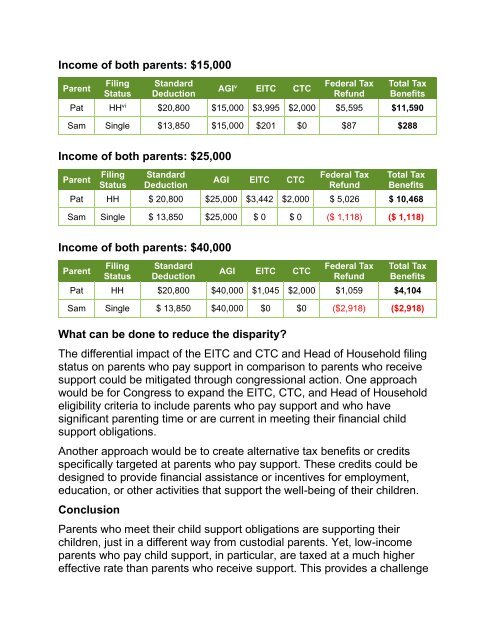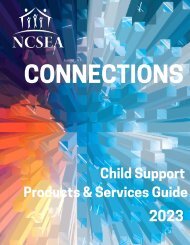April 2024 CSQ
You also want an ePaper? Increase the reach of your titles
YUMPU automatically turns print PDFs into web optimized ePapers that Google loves.
Income of both parents: $15,000<br />
Parent<br />
Filing<br />
Status<br />
Standard<br />
Deduction<br />
AGI v EITC CTC<br />
Federal Tax<br />
Refund<br />
Total Tax<br />
Benefits<br />
Pat HH vi $20,800 $15,000 $3,995 $2,000 $5,595 $11,590<br />
Sam Single $13,850 $15,000 $201 $0 $87 $288<br />
Income of both parents: $25,000<br />
Parent<br />
Filing<br />
Status<br />
Standard<br />
Deduction<br />
AGI EITC CTC<br />
Federal Tax<br />
Refund<br />
Total Tax<br />
Benefits<br />
Pat HH $ 20,800 $25,000 $3,442 $2,000 $ 5,026 $ 10,468<br />
Sam Single $ 13,850 $25,000 $ 0 $ 0 ($ 1,118) ($ 1,118)<br />
Income of both parents: $40,000<br />
Parent<br />
Filing<br />
Status<br />
Standard<br />
Deduction<br />
AGI EITC CTC<br />
Federal Tax<br />
Refund<br />
Total Tax<br />
Benefits<br />
Pat HH $20,800 $40,000 $1,045 $2,000 $1,059 $4,104<br />
Sam Single $ 13,850 $40,000 $0 $0 ($2,918) ($2,918)<br />
What can be done to reduce the disparity?<br />
The differential impact of the EITC and CTC and Head of Household filing<br />
status on parents who pay support in comparison to parents who receive<br />
support could be mitigated through congressional action. One approach<br />
would be for Congress to expand the EITC, CTC, and Head of Household<br />
eligibility criteria to include parents who pay support and who have<br />
significant parenting time or are current in meeting their financial child<br />
support obligations.<br />
Another approach would be to create alternative tax benefits or credits<br />
specifically targeted at parents who pay support. These credits could be<br />
designed to provide financial assistance or incentives for employment,<br />
education, or other activities that support the well-being of their children.<br />
Conclusion<br />
Parents who meet their child support obligations are supporting their<br />
children, just in a different way from custodial parents. Yet, low-income<br />
parents who pay child support, in particular, are taxed at a much higher<br />
effective rate than parents who receive support. This provides a challenge















